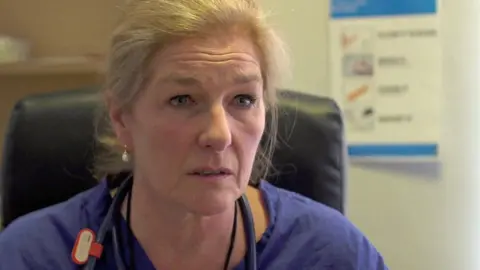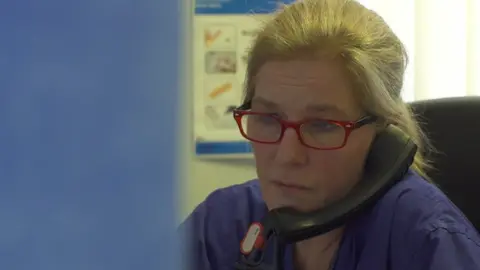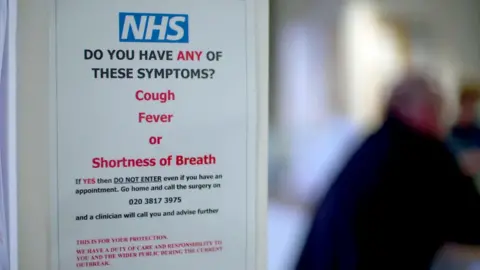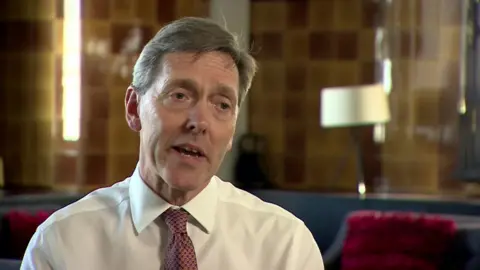Coronavirus: GPs prepare for NHS's 'biggest crisis'
 BBC
BBCAs coronavirus spreads widely across the UK, many of those who fall sick may seek treatment at their GP's surgery.
Are family doctors ready to deal with a wave of patients, prevent the spread of the disease and protect the most vulnerable?
The doctor
According to the tests carried out so far, there are hardly any diagnosed patients with Covid-19 in the neighbourhood of Dr Jane Wheatley's north London surgery.
In reality she believes there are likely to be many people with the coronavirus out there - and the government agrees, estimating the true extent of the infection nationwide at between 5,000 to 10,000 cases as of Friday.
With testing not available for every patient, it's hard to be sure.
She says: "We know there is community transmission. Obviously we can't tell which patients have the normal influenza virus or a cold and which ones have the Covid-19 disease. We can't distinguish based on symptoms."

- EASY STEPS: What should I do?
- CONTAINMENT: What it means to self-isolate
- HOW IS THE UK PREPARING? The government's plans
- MAPS AND CHARTS: Visual guide to the outbreak
- VIDEO: The 20-second hand wash

Dr Wheatley says it has been impossible for her to get patients tested unless they have either been to a high-risk country or been in contact with a known case of Covid-19.
But she's "had suspicions" about patients who have been in contact with people returning from Hong Kong or Italy - but who did not fit the criteria to get tested themselves.
Her surgery displays a sign warning anyone with a cough or fever to go home and use the phone. Fluid-resistant surgical masks have just arrived and the practice was already equipped with plastic aprons and gloves.

But they do not have the most effective respirator masks, as supplies are being kept for hospitals, which will deal with the most serious infections - prompting fears for the safety of medical staff.
Dr Wheatley says: "I'm going to see sick people, that's what we do. But I want to have the right equipment to protect myself."
She says guidance for GPs has lagged behind that for hospital staff, saying: "Things weren't happening quickly enough and we were making ourselves vulnerable."
"I don't want to get sick, but I still want to do my job.
"If I'm sick or even exposed and have to self-isolate, that leaves our surgery without a doctor, which puts extra strain on colleagues. But I don't want to infect elderly and vulnerable people, I don't want to infect my colleagues, I don't want to infect my family, my elderly relatives."
She would like to see a standardised way of managing people with respiratory illnesses - such as an initial telephone consultation - so they can be kept apart from other patients.
As the outbreak continues to grow, she's having to warn regular patients to expect appointments to be disrupted.
As healthcare workers fall ill or have to self-isolate, routine work such as health checks for over-75s or diabetic checks will have to be reduced, she says.
"I'm counselling patients on what's coming. We're always stretched, we work at capacity," she says. "I'm not panicking, I'm taking precautions."
The receptionist
With GP surgeries told to limit the number of people who visit in person, receptionists are under pressure as they try to deal with the volume of calls.
Georgia, a receptionist in Hertfordshire, tells the BBC: "It's just been chaos. I haven't seen anything like it this before."
She says the phone had been "ringing off the hook" but for many patients' questions, there were simply no answers yet.

The surgery is equipped with masks, gloves and deep cleaning tools, and has been directing people to self-isolate if they show the symptoms of a cough or a fever.
"It's been very emotionally and physically draining. We are doing our best to help, but at the moment it's a lot to handle," says Georgia.
The expert
"This is a massive crisis, probably the biggest crisis the NHS has ever had to face," says Prof Martin Marshall, an east London GP who is also chair of the Royal College of General Practitioners' council.
He says not enough has been done yet to prepare family doctors for the epidemic, although he adds: "We need to be a little bit understanding of the pressures that the whole system is under."
As the virus circulates in the community, he says we need "urgent action" to protect healthcare workers, give them the information they need and provide technology to allow for more consultations by phone or the internet.

Administrative tasks for GPs should be suspended during the crisis, he says, and staff need to be tested as a priority.
Given the pressures the NHS will be under, Prof Marshall says it is vital that doctors and nurses are not taken out of action for seven days of isolation unnecessarily.
"We're not saying that health professionals are more important than patients, we're saying that health professionals have a responsibility," he says.
"We therefore need to keep them as healthy as possible and we need to get them back into the workforce as quickly as possible. So we're asking that health professionals are tested early."
